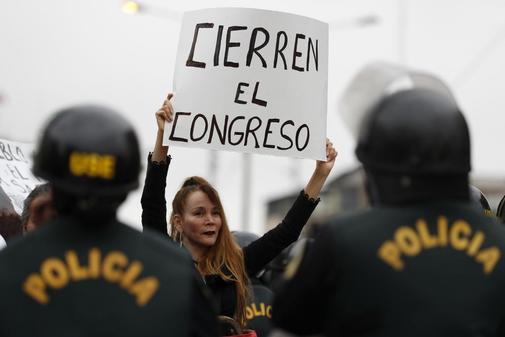Peruvian President Martín Vizcarra has constitutionally dissolved the Congress, dominated by the opposition, which replied by suspending the president and appointing Vice President Mercedes Aráoz temporarily .
"I have decided to dissolve Congress and call parliamentary elections ," Vizcarra said in a message to the country on television, as a clash of powers began three years ago and closed the path of understanding between the executive and legislative .
The drop that has filled the glass of water for Vizcarra was the refusal of Congress to suspend a controversial appointment of new members of the Constitutional Court .
Vizcarra had released an ultimatum to Congress on Sunday by announcing that he would dissolve it if he denied him a vote of confidence on Monday to reform the method of appointing magistrates, thereby seeking to prevent that high court from being taken over by the opposition .
As a result of the denial of the vote of confidence, the Prime Minister, Salvador del Solar, resigned. In his replacement Vizcarra appointed Vicente Zevallos , his justice minister.
A dissolution of the Congress in Peru did not occur since April 5, 1992 , when the then president Alberto Fujimori (1990-2000) gave a "self-coup" and assumed full powers with the support of the armed forces. On this occasion, however, Vizcarra relied on the Constitution to take this step.
The dissolved parliament soon reacted, suspending Vizcarra for one year to serve as president . The suspension was approved by 86 votes from a total of 130 legislators.
The Congress declared the "temporary incapacity" of Vizcarra and appointed in its place as interim president for a year to Araoz.
"It is my duty as a citizen, woman, mother and vice president to assume this mandate. The easiest thing would have been to resign . I do not run into my responsibilities, no matter how difficult the circumstances may be," said Araoz, who called the dissolution of the "unconstitutional" Congress.
Meanwhile, Vizcarra called for new parliamentary elections on January 26, according to a decree published in the official gazette.
"A coup"
"We are facing a coup d'etat, it reminds me of April 5, 92. I hope that the Armed Forces and the Police do not lend themselves to this hoax," said social democratic legislator Jorge Del Castillo, now an ally of Fujimori, on the dissolution congressional.
On the other hand, the leftist leader Verónika Mendoza led a march of more than 2,000 protesters in Lima in support of Vizcarra's decision.
"We are here celebrating this victory that has cost us, it is the first step of the Peruvian people ," said Mendoza, whose party bounced in parliament in favor of dissolution.
Marches in support of the dissolution happened on Monday night in the main cities of the country, such as Huancayo, Cusco, Arequipa, Puno, Trujillo and Tacna , among others.
The president has gained great popularity by leading a crusade against corruption in a country where the previous four presidents were under the magnifying glass of the prosecution accused of receiving gifts from the Brazilian construction company Odebrecht.
Vizcarra asked for the vote of confidence after Congress filed its project to advance elections to April 2020 on Thursday, which meant cutting off its mandate and that of the Legislative one year . The proposal was supported by 75% of Peruvians, according to surveys.
Opposition legislators do not want early elections , as they risk their loose majority at a time when they suffer great discredit, according to polls. In addition, due to a Vizcarra reform ratified in a referendum in 2018, parliamentarians cannot be re-elected.
The Constitutional Court is responsible for interpreting the Magna Carta and acts as the last judicial instance in amparo remedies , such as the one presented so that Keiko Fujimori regains her freedom.
The opposition leader has been in preventive detention for 11 months for the Odebrecht scandal and the ruling on her appeal will be announced shortly by the court.
In addition to the government, independent jurists questioned the current selection mechanism of the Court for its speed and lack of transparency.
The political crisis persists in Peru since three years ago banker Pedro Pablo Kuczynski (2016-2018) beat populist Keiko tightly.
Although he lost the presidency, Alberto Fujimori's firstborn party won an overwhelming majority in Congress with which he kept Kuczynski on the ropes until he was forced to resign in March 2018, when Vizcarra, his first vice president, replaced him.
Vizcarra lacks a party and parliamentary bench, but, unlike his predecessor, he has faced Congress strongly .
According to the criteria of The Trust Project
Know more- America
- international
Peru Keiko Fujimori transferred from prison to a clinic for coronary problems
Mexico The Mexican Prosecutor's Office will persecute negligent officials in the case of 43 Ayotzinapa students
Populism Manual to destroy a democracy and make your country a dictatorship

